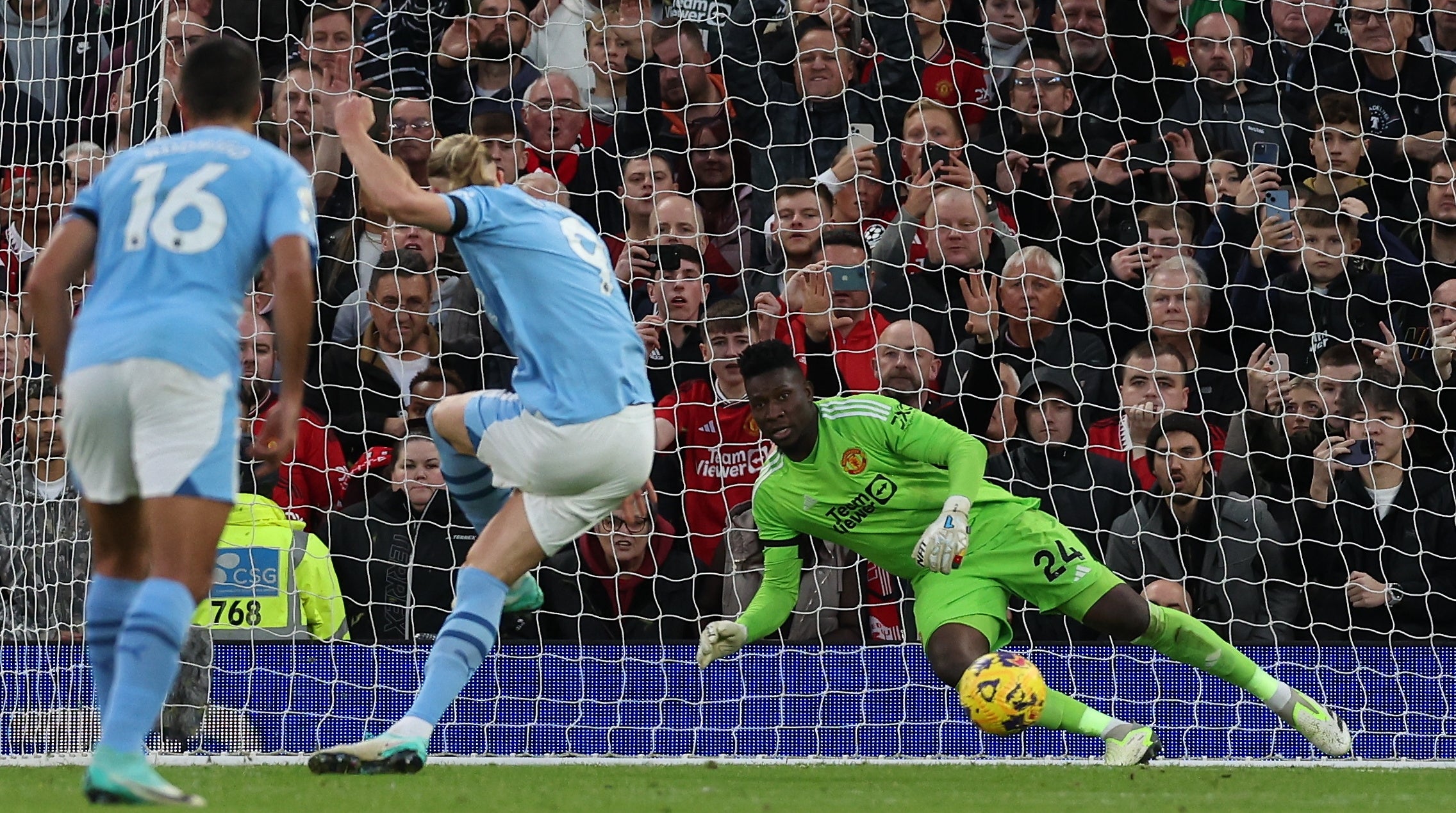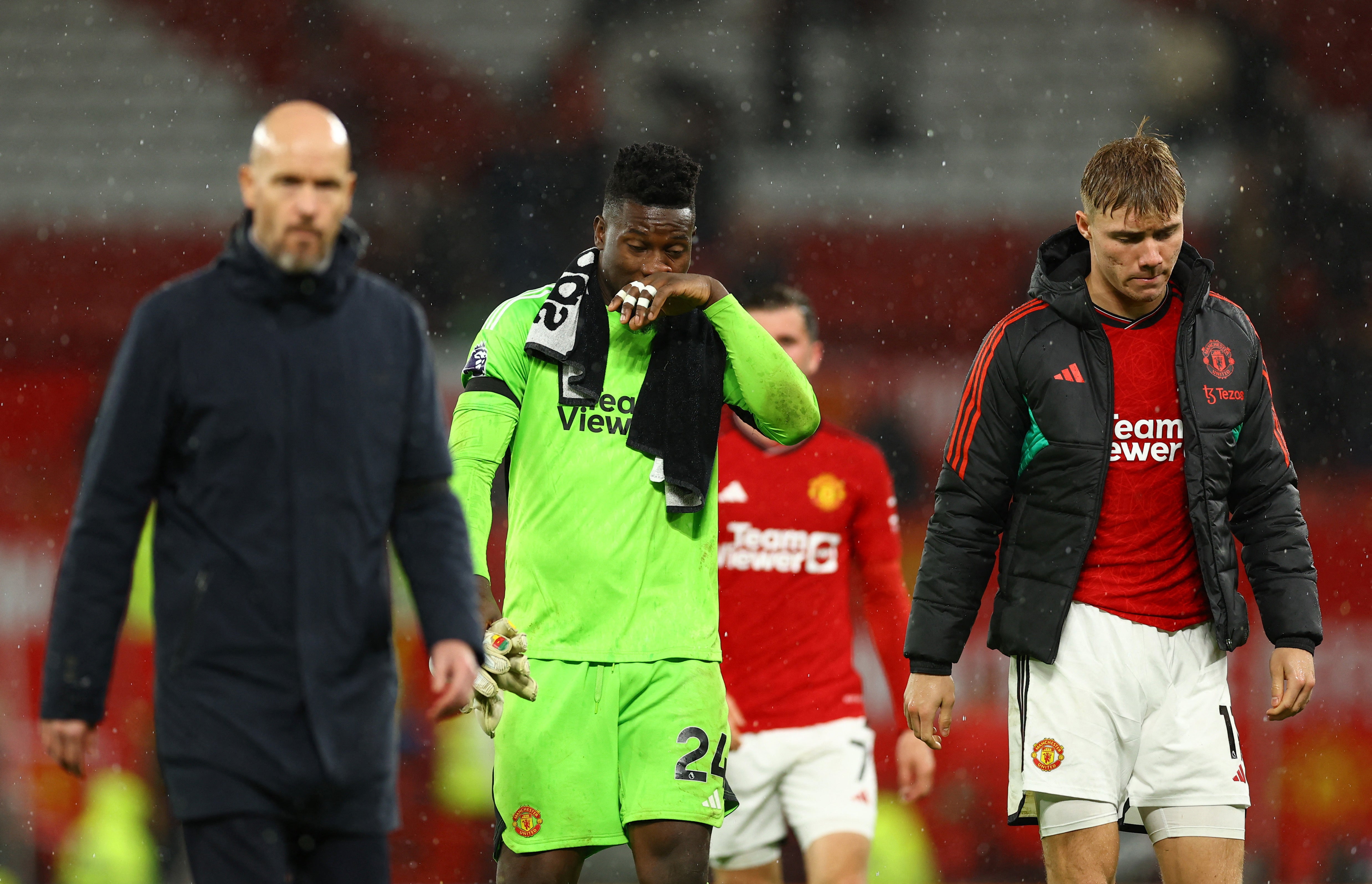Erling Haaland celebrates after opening the scoring from the penalty spot at Old Trafford
Sign up to Miguel Delaney’s Reading the Game newsletter sent straight to your inbox for free
Sign up to Miguel’s Delaney’s free weekly newsletter
Thanks for signing up to the
Football email
Had this not been at a grand but crumbling Old Trafford, and bedecked in all the regalia of what is supposed to be one of the Premier League’s biggest games, most watching on would have fairly dismissed it as another routine Manchester City win over some mid-table side way below them.
Instead, this 3-0 defeat at home will send Manchester United back into crisis, and provoke even more questions about Erik ten Hag.
There is a growing sense he is struggling to come up with answers. Mitigating circumstances only go so far when United have just offered up City’s second-easiest win of the season, in what is supposed to be the fixture that means the most. Only Fulham were beaten by more, but it still felt like they put up more of a fight. So did relative European minnows in the modern game such as Red Star Belgrade and Young Boys Bern. They only lost 3-1 to the European champions.
How United would have valued even the reprieve of the goal here. City were simply so much better than them without even needing to be that good.
That is where the biggest concerns about Ten Hag should be now. A defeat like this leads into a greater feeling that all direction is lost. The bottom-half approach was clearly defeatist, and the whole team just lacking in quality.
It felt like City could score at will if they needed to.
Their fans revelled in that, after an admirably respectful celebration of Sir Bobby Charlton’s life before the game.
There were many legends at Old Trafford for that, and they must have been discussing how much things have changed. That isn’t a new discussion of course, but Ten Hag’s false dawn of last season makes it seem like it is now even more galling.
If the decision that set the defeat in motion might have felt debatable to many, there could be no real argument about where the game was going. It was clear straight away from how the teams set up.
Unusually far from his tactical ideal after more than a year into the job, Ten Hag had to set up like an inferior team. They sat deep and sought to nick the ball off City when they could. Against that, Guardiola’s team just took control of the ball and took the game forward. Virtually all of the play was around the United area, making it an inevitability that City would eventually get sufficient chances and a striker like Erling Haaland would take them.
The only surprise was that he missed two presentable opportunities from open play, although it should have been instructive for Ten Hag how the Norwegian was just left unmarked near the six-yard box.
For the first chance, Onana actually knocked it up for him only to respond to Haaland’s unexpectedly ponderous movement brilliantly. Perhaps the striker was unusually slack in that situation because he knew another would come along. Onana did even better for that one just before half-time, diving acrobatically to palm the ball away.
By then, though, City were already ahead because Rasmus Hojlund had his palm on Rodri in the box.
It may have been soft, it may not have been “clear and obvious” and it may happen an awful lot in games but it is the law. Haaland re-established the new order by scoring the penalty.
And that, really, was pretty much that.
There was only one goal in it but there was a chasm between the sides and how they could use the ball.
City supporters were already assertively singing about the 6-1 from 2011, a result that many at United at the time wrote off as a “freak”. That’s what is so dismal about this for United supporters. A heavy beating here wouldn’t have been a freak at all. It could have been something that easily happened from the general direction of play. City had enough chances without lifting it too much, United by contrast having to fight and strive for every opening.
There were one or two, of course, but they really came from individual will rather than any kind of collective approach. The irrepressible Hojlund had been responsible for one of them just driving up the City half but having that bit too much to do.
The decision to take him off was loudly booed by a lot of Old Trafford, that sound really saying how concerning it should be that a lad recently out of his teens is already seen as a saviour.
Haaland had of course taken one of those headers by that point, Onana this time unable to do much.
It was one occasion where he could justifiably have been furious with his defence. How could they leave a player who might well be the best in the world now unmarked again?
City’s dominance has raised greater debate about the ownership and the direction of the game, especially with the 115 charges for alleged breaches of Financial Fair Play rules still weighing over the game, but there should still be a profound frustration about how far off United are.
England’s wealthiest club should still be able to give them a better game. They should still be closer, especially when four players on their bench cost a combined £215.7m.
The Glazer takeover should never have been allowed but the actual play should never have got this bad.
City fans sang the name of Sheikh Mansour before going for “USA USA USA” and that evolved into “easy easy” as Phil Foden turned in a generous Haaland pass. It is striking that maybe the game’s greatest ever goal machine – yes, already – can do that when a hat-trick presents itself but still rack up records.
City could have gone even further here, maybe even testing that 6-1. They didn’t need to, which is one of the greatest insults of all.
Everyone knows exactly what City are, as their fans raucously reminded, loudly singing “champions of Europe”.
At this point, who knows what United are supposed to be? Take away all the context, and it could very easily be some mid-table team going nowhere.
Source: Read Full Article


